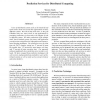215 search results - page 10 / 43 » Learning to Predict User Operations for Adaptive Scheduling |
IUI
2005
ACM
14 years 28 days ago
2005
ACM
We describe a method for predicting user intentions as part of a human-robot interface. In particular, we show that funnels, i.e., geometric objects that partition the input space...
IPPS
2007
IEEE
14 years 1 months ago
2007
IEEE
Users of distributed systems such as the TeraGrid and Open Science Grid can execute their applications on many different systems. We wish to help such users, or the grid scheduler...
ICIW
2009
IEEE
14 years 2 months ago
2009
IEEE
— Personalized Web Search becomes nowadays a promising option in the field of Information Retrieval and search engines design by improving both output quality and user experience...
CI
2002
13 years 7 months ago
2002
As online markets for the exchange of goods and services become more common, the study of markets composed at least in part of autonomous agents has taken on increasing importance...
CASES
2007
ACM
13 years 11 months ago
2007
ACM
Delayed branching is a technique to alleviate branch hazards without expensive hardware branch prediction mechanisms. For VLIW processors with deep pipelines and many issue slots,...


